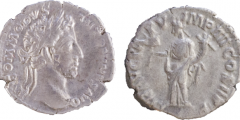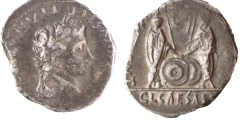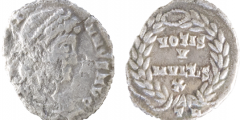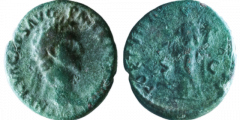My experiences of the British School at Rome’s Summer School
October 31, 2016
Undergraduate in Ancient History Ben White writes about his experiences as part of the British School at Rome’s summer school.
A Reign of Terror
January 20, 2015
As part of the Nottingham ‘Anniversaries through Coins’ project, Larissa Ransom describes how, on this day, 20th January 175AD, Commodus was enrolled into all sacred colleges as priest Commodus (Caesar Marcus Aurelius Commodus Antoninus Augustus) was born on 31st August 161AD to Marcus Aurelius and his wife, Faustina the Younger. He was the sole surviving …
Res publica restituta?
January 16, 2015
As part of the Nottingham ‘Anniversaries through Coins’ project, Matthew Myers describes how on this day, the 16th January in 27 BC, Octavian became Augustus. Following the defeat of his former ally Marc Antony and the Egyptian queen Cleopatra at the battle of Actium in 31 BC, Octavian emerged as the victor of civil war …
Julian ‘the Apostate’ Comes to Power
December 11, 2014
As part of the Nottingham Anniversaries through Coins project, Robert Stone describes how on this day, 11th December, in 361, the last pagan emperor Julian II (also known as Julian the Apostate) entered Constantinople as the sole ruler of the Roman Empire. Following the death of Constantine I (337), the Empire was divided between his …
We have two blog entries today, both from doctoral students in Classics: in the first, Peter Davies, reflects on the legacy of the poet Simonides’ words in commemorating the fallen…
November 11, 2014
After the battle of Thermopylae – immortalised by Herodotus and, in our own time, given new fame by Snyder’s epic 300 – the Lyric poet Simonides wrote an encomium for the Greek dead. In 1838 John Sterling would translate some of his words thus: Of those who at Thermopylae were slain, Glorious the doom, and …
On this day, November 8th, in AD 30, Marcus Cocceius Nerva was born.
November 8, 2014
As part of the Nottingham Anniversaries through Coins project, Mike Welbourne offers some thoughts on Nerva, Rome’s twelfth emperor, on the anniversary of his birth. According to Aurelius Victor (Epitome de Caesaribus, 12.1) Nerva was born in the Italian town of Narnia. On his father’s side he came from a family that had been intimately …
Roman noses
April 25, 2014
Mark Bradley sniffs out the significance of noses for Romans and others. Go back a hundred years or so, and well-to-do men and women in Berlin could be very conscious about their nose-shape. Anyone who had a potato nose, saddle nose or duckbill nose, or one that was wide, pointy, long, hook or slant had good …








Recent Comments